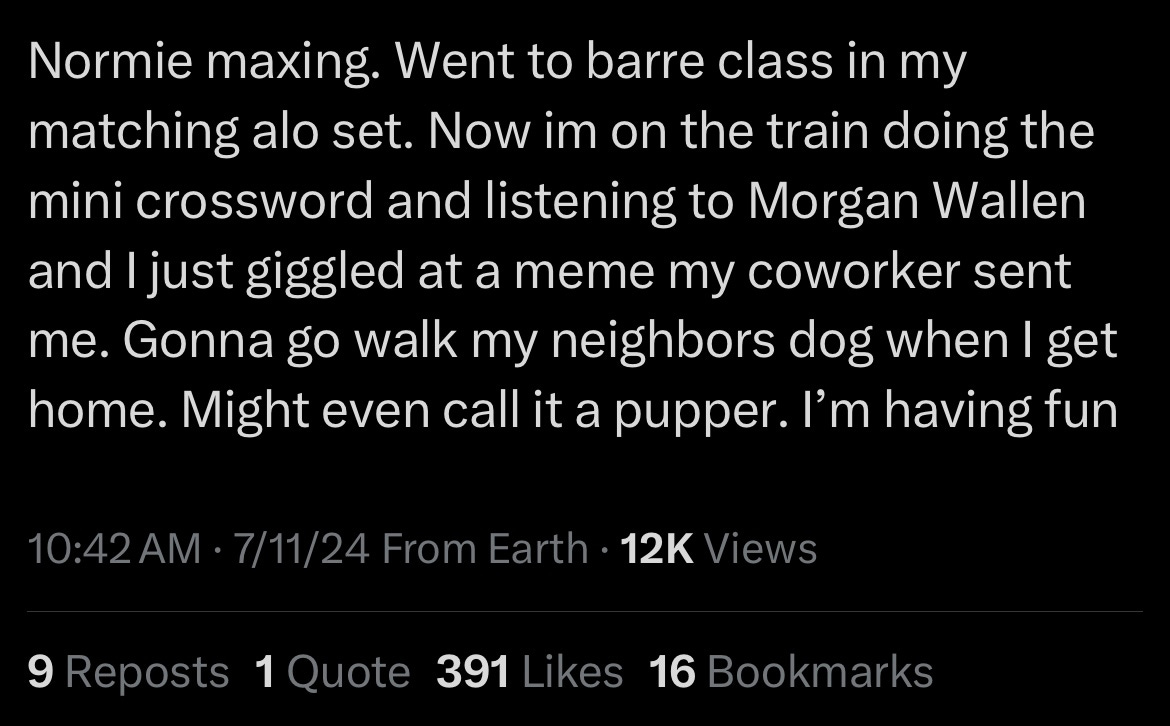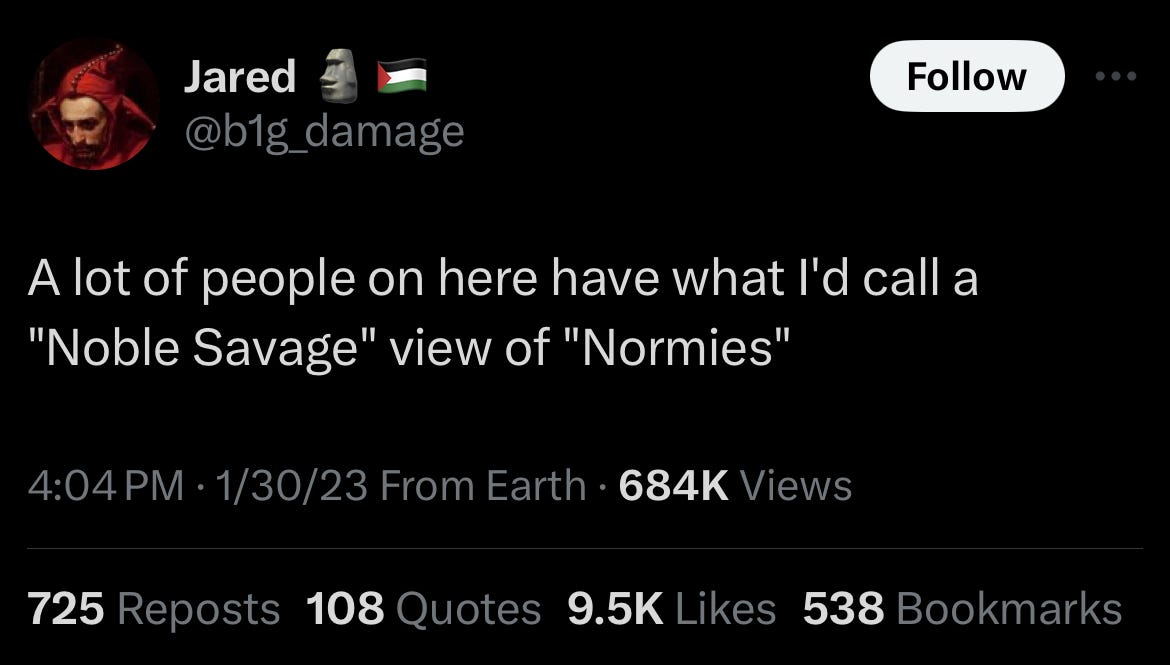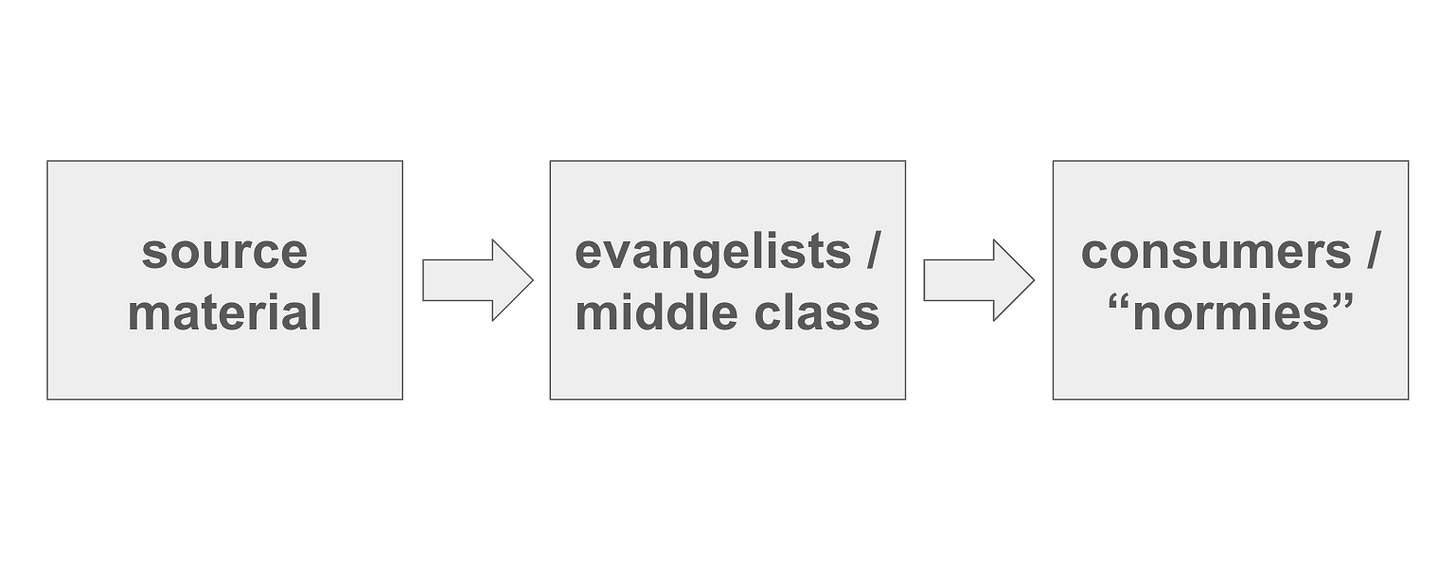I'm normal and I'm proud!
A meandering essay on self esteem, coolness, and the cultural middle class
I’ve always struggled with comparing myself to others. Summer is a particularly brutal time for my self esteem because of this reason — everyone I know always seems to be taking the most expensive trips, frequenting the most exclusive locales, and generally having the most fun. The fun they’re having is blasted all across social media, where I see it from my sofa, internalize it, and weaponize it against myself before promptly clicking the “Next” button on my television to watch my sixth episode of Veep for the day.
I know I’m not alone in feeling this way. I recently read Sarah Cucchiara’s essay on being an it girl and found it insanely reaffirming. Tons of people want to be special and different in a very specific way, in order to fit a very specific (read: socially acceptable) view of what it means to be different. We can’t possibly all be it girls — and that’s okay!
It’s a big step to recognize those feelings of self judgement, but it’s entirely another to actually do something about the feeling that you’re just not good enough. Contrary to what it may seem, I don’t have super low self esteem. I’m good at communicating what I need, setting boundaries, and taking feedback. I’ve gotten a lot better about reducing negative self talk internally and externally, and I trust myself to make decisions that make sense for my life and goals. And despite all of that, I still struggle frequently with self comparison. So, what gives?
Self reflection has led me to many different answers, but one sticks out above the rest — I’m judgmental. Maybe it’s because I have a compulsive need to have an opinion about everything. Maybe I’m just not as nice of a person as I think myself to be. Whatever the reason is, I find myself noticing and placing judgement on the things people around me do, whether they’re insignificant (not ironing clothes before wearing them) or pretty major (saying things or making choices I don’t agree with).
A lot of other people do this too, obviously, and it’s often executed by way of condescension and subtlety. Instead of outwardly calling people stupid, we tweet about how we wish we could be them, know them, date them. We dream of the Average Joe or Jane — a medium-attractive person who watches Instagram reels instead of TikToks and doesn’t know what “looksmaxxing” means. These imagined people genuinely love the media and hobbies we think are beneath us. Not only that, they feel completely free and happy in openly doing so.

Of course, we don’t actually want to be these people. But we idolize and fetishize their perceived simpleness and the way that they move through life differently than we do. There’s always an implication that because they aren’t like us, they are inherently inferior and/or don’t experience a rich inner world. We use the phrase “coworker meme” to describe phenomena like the hawk tuah video, Damn Daniel, or any other meme that is simple enough for the average person to understand without a deep understanding of commonplace internet lore.
Truthfully, it’s straight up mean girl behavior, which many people who post this kind of stuff will openly admit to. It’s the face of modern bullying, online and offline: making people feel excluded in a way that isn’t necessarily easy to identify and provides you with plausible deniability about the intentions of your actions. It removes the humanity of both parties involved by categorizing the traits of people’s personhood and then placing value judgement on those sweeping categorizations.

Now, I’m not going to speak for everyone, because god forbid I forget one of the internet’s many special exceptions to the characterization I’m about to make. But in myself, I notice I engage in this behavior largely as a coping mechanism for the social alienation I’ve experienced in my own life. I attended high school as a visibly queer teenager during the mid-2010s, in a suburban town where Donald Trump overwhelmingly beat Hillary Clinton at the polls. I’ve also experienced struggles with my gender identity, isolating mental health issues, and just generally always being the awkward/weird kid.
Because I’m unique in a way that isn’t quite palatable to the culture or internet algorithms, I find myself being a part of what I call the cultural middle class — the people who prop up the true tastemakers and upper echelon of culture, propelling them to widespread success and stardom, but never quite making it there ourselves. These people are the “cult” portion of the term “cult following”. We’re Charli xcx fans, A24 enjoyers, and Succession watchers. We wear Adidas Sambas sneakers and romanticize Sofia Coppola movies, always having done and enjoyed things “before they were cool”.

In my view, there are many people who are a part of this cultural middle class but will never admit it to themselves, namely because being anywhere other than the top is embarrassing. I want to be “so Julia” — effortlessly cool and chic in a way that can only be achieved by those with the exactly perfect ratio of beauty, quirkiness, and artistic vision. But because I have a hard time actually being so Julia in practice, I feel inferior, which then makes me lash out onto the consumer class of “normies” who I perceive to be beneath me. If I don’t distinguish myself from them, then where am I supposed to find my worth? How am I supposed to know if I’m “cool” or not?
The issue fundamentally lies in the way we view coolness: as a currency that one can possess more or less of, which gives you an objective placement somewhere within the hierarchy of the pyramid. While the internet has opened the door for people to express themselves in ways that are contrary to what has been historically acceptable, it hasn’t quite made it so people can truly be themselves. Rather, it’s simply allowed for there to be more variations on the cultural rubric by which we grade and dole out points ourselves and others.
To solve this problem, we need to remove the self-imposed hierarchy and visualize a new way of how each of these creative groups function. I’m choosing to see it as more of a flow of information, where everyone involved is simply at different stages in the artistic discovery process. Critically, all parties (including and especially artists) are on the same horizontal axis.
This framework also represents the very random nature of artistic inspiration, and the fact that artists are just as likely to get inspiration from Faulkner as they are from a seemingly insignificant object or experience. An easy and relevant example of this is Charli xcx’s “Everything is romantic” — a song with massive critical acclaim whose lyrics center on innocuous things like “white sheets [and] lace curtains” and “neon orange drinks on the beach”. Loving and appreciating the most basic things in life can give us unlimited creative potential.
Which leads me to my call to action: love things that are popular and love them with your chest. I hear people say a lot that they listen to certain types of music, wear certain items of clothing, and engage in certain activities “ironically” as a way of making fun of the people who take it seriously. But what good is that doing? All it does is form a growing chasm between us and our interests, triggering a never-ending shame spiral. We engage with something because we like it, we feel shame for having experienced joy or happiness because of that thing, and then we slap on a label of irony on it to make ourselves feel better. (Spoiler alert: it never does.)
When we accept ourselves fully and honestly, perceived “warts” and all, we can stop worrying about what people think of us. Allow yourself to be in flux, floating between creative, evangelist and consumer. Recognize that it’s possible and a good thing to be all three at once. Stop saying you like things ironically, just enjoy them!
I won’t be a hypocrite and say all of this without exposing myself here. I’m addicted to shitty mobile games. I watched the Trolls trilogy because I wanted to, and genuinely enjoyed it. My hype music for doing dishes is early 2010s David Guetta. None of these things are indicative of my worth, because I’m no longer assigning value to them.
I challenge anyone reading this to share one of their “guilty pleasures” with the world — whether it’s in the safe space of the comments here, or somewhere else. Share the nitty gritty details of the things you like when nobody else is around. Take yourself out of the box you’re in, whether you’ve put yourself there or the world has put you there, and dare to portray yourself more complexly than you normally would. By being more vulnerable and open, we open our hearts to see the nuances of others. Loving others unconditionally helps us love ourselves that way, too.







The way “none of these things are indicative of my worth, because I’m no longer assigning value to them” hit me 🥹 Such an amazing read. Thank you for this. Really grateful for vivthemole for sharing because I immediately got sucked in and thoroughly enjoyed your writing.
the pyramid is SO good!!! have definitely been guilty of normie-bashing lol